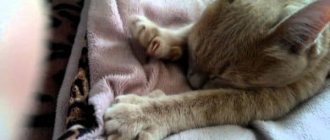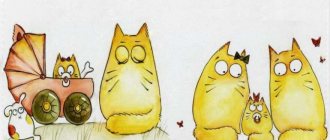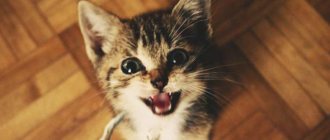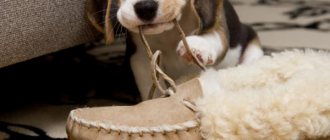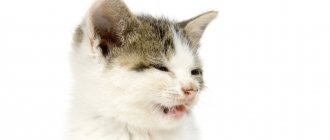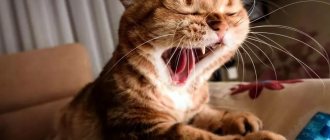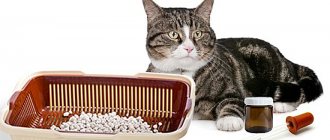What causes the sucking reflex in kittens?
The mother’s ability to suckle is an unconditioned reflex that ensures the vital functions of the body. A newborn kitten, who can only squeak and suck, chooses its mother's nipple. She grabs it into her mouth, strokes it with her tongue, moves her paws over the mother’s belly, stimulating lactation, and defends the right to food, pushing away her sisters and brothers.
Although the eyes and ears are closed, the sense of smell and touch works:
- the nipple is located by smell;
- body position is adjusted using thermoregulation and tactile receptors.
Important. The first teeth appear from the 12th day; feeding with raw meat is allowed from 3-4 weeks of age. It is cut into thin strips, “worms”, which the kitten swallows with a sucking movement - it cannot chew yet.
A cat in the village or a wild one brings mice, independently accustoming the cubs to solid food. The transition to a normal diet for the species lasts up to 6 months.
People acquire month-old sucklers, sometimes a little older than a month. The transition to food that is convenient for the owner is abrupt; in this case, the sucking reflex does not subside, but this is the most favorable time to wean the kitten from sucking.
This is interesting: How to care for a kitten?
How to wean a cat
The mother's discomfort will be immediately noticeable.
It is recommended to separate kittens from their mother when she is ready for this. Most often this happens during teething in babies. She will become irritable and hide from the children.
To distract kittens older than three months from their mother, you can:
- distract with interesting games . Buy noisy toys, or those that have the smell of some kind of delicacy;
- During the process of weaning from the mother kittens cannot be rehoused ; it is better to buy a new nest for the cat. The kids will already be nervous, and you will also take away their shelter;
- If the cat has become accustomed to sucking your things, you should not leave them in a visible place. Always hide them in a closet or other place inaccessible to your pet. After some time of absence of the object of desire, the animal must forget about its idea;
- If the cat prefers to suck parts of the human body: his ears and fingers, it is recommended to proceed gradually. If these are fingers, it is better to let the animal suck only one of your fingers. Others cannot be given. Then put on a leather glove that you don't mind.
- You can try coating the item with citrus juice or black pepper . But if this does not help, it is better to choose another option. Such actions do not have a positive effect on the pet. And in our case, a peaceful solution to problems is the best option.
You can try coating the item with pepper or citrus juice.
Animal psychologists say that kittens who received moral trauma in childhood can continue the sucking reflex for up to three years. And it is almost impossible to get rid of this.
The animal must recover on its own.
When you accustom him to the glove and arrange your pet’s own shelter, be sure to put that same glove inside. Moreover, washing it is strictly prohibited. Over time, the problem will resolve itself.
Why does a cat suck a blanket, blanket, tail or paw?
Owners don’t think about how to wean a cat from sucking a blanket if every morning the pet has a happy face:
- jumps on the bed;
- paws;
- purrs with pleasure.
This behavior is a sign of trust and love between the pet and its owner. Sucking on a blanket saturated with the scent of a person of the highest rank in the family is a recognition of strength and, at the same time, one’s own safety.
If the cat sucks on blankets and other bedding not in the morning, there are several reasons:
- Impaired metabolism.
- Stressful situation (sucking calms).
- The kitten is teething.
- The sucking reflex has not faded in a baby or an already mature cat.
Sucking a tail or paw should alert the owner : perhaps the cat is trying to pull out a splinter. If, when you carefully feel the paw, the cat withdraws the limb, you will need the help of a veterinarian. If no pain is observed, he may have been taken away from his mother early or he is experiencing severe stress.
Why do some cats suck fur?
Sometimes cat owners notice that their pets, starting at a certain age, suck woolen things . This clearly abnormal behavior worries the owners. And for good reason: if a cat gets used to it, sucking fur can lead to serious consequences. Sucking on fur for a long period of time can cause strands of hair to come off, which can cause your cat to ingest them and may require surgery to treat the intestinal blockage they cause. So why do cats suck fur?
The answer can be obtained by taking a closer look at exactly how cats make the sucking movement. Having found a thing in the house made of wool or other soft material, the cat sits on it with a contented look and begins to suck or chew it, alternately trampling the material with its front paws. At the same time, she completely forgets herself with pleasure and stops paying attention to her surroundings. It is absolutely clear that this seemingly meaningless task gives her great pleasure. And, if not for the danger of swallowing the fibers, it would not have caused her any harm. The reason for the addiction to wool is not at all difficult to find. What the cat does with the clothes is identical to the process of feeding a tiny kitten from its mother's nipples. The kitten presses its paws on her belly to simulate milk production, and if a fur-sucking cat does this with a piece of cloth, then it is clear that she treats the cloth as a surrogate mother. In other words, sucking wool is like using a pacifier. In the same way, babies suck on a pacifier (and adult men suck on a pipe).
Hair sucking is most often characteristic of young cats that were either abandoned by their mother or, for some reason, taken from her early. Most often this begins immediately after weaning and continues for several months. However, in many cats, especially Siamese, it lasts throughout their lives, and it is very difficult to wean them from this habit.
The special attractiveness of wool is explained by the presence of lanolin in it, which evokes a subconscious memory of the mother in the cat. When sucking, the wool becomes moisturized and the smell of lanolin intensifies. The cat gets carried away, and the sucking or chewing consumes its entire being.
It is known that cats who cannot find anything woolen, in a fit of desire to recapture the unforgettable childhood sensations, suck on their own fur - sometimes their paws, sometimes the tip of their tail. Sometimes they pay attention to the owner’s hair and try again and again to get to it.
Some experts suggest changing the diet of such animals, but this is hardly logical, unless changing dishes will help the cat fight boredom. Indeed, monotony seems to push cats to suck wool , and the best remedy for this would be to make their lives more vibrant and eventful.
Such radical methods of treating cats for this addiction, such as slipping them a piece of fur coated with some kind of repulsive chemical, do not give the desired effect. The animal waits until the treated piece is thrown away and settles down to another, more suitable one, but it is not possible to process all woolen items: sooner or later the cat will outwit its owner. The only solution is to change the cat’s very thinking and relieve her of the stress that causes her to fall into childhood.
Source: H. Nepomnyashchy “What’s on the cat’s mind?”
Why do kittens stick to objects?
If your cat is sucking on your hand, ear, or other things, the following may be the cause:
- Early weaning from breastfeeding mother's milk or mother cat.
- Lack of love and care from the owner. Kittens feel a particular shortage during adaptation and socialization. At this time, the owner will need to create the most comfortable conditions for the growth and development of the pet, and protect it from stress.
- Boredom. If a kitten is bored, it may begin to exhibit a sucking reflex.
- Hereditary or breed predisposition. When the kitten's parents had the same habits, with a high degree of probability they can be passed on to the small cat. In addition, representatives of the Persian and Siamese breeds are most susceptible to the sucking reflex.
- Constant stress.
- Diseases of the endocrine system and dental problems. In this situation, the presence of pathologies can only be determined by a veterinarian. If the owner of a kitten suspects the development of illnesses, you need to take the kitty to a veterinary clinic.
Often this habit is formed in children who are artificial.
Being on artificial feeding and underfeeding also causes the sucking reflex to appear. In this case, cats often try to get food for themselves on their own. Often the pet cuddles in woolen clothes, which remind him of his mother. It is important for the owner to force the cat to get rid of this habit as soon as possible, since hairballs get stuck in the stomach and cause problems with the digestive system. In addition, similar behavior can be observed when there is a lack of vitamins in the body.
Methods
The kitten needs the sucking reflex in the first weeks of life. Over time, it weakens, and pets acquire the ability to feed on their own. In some cases, atypical behavior of babies is observed: they continue to cling to the mother’s empty nipples, suck the owner’s fingers, and try to gnaw hard objects.
To combat a bad habit, it is important for the owner to maintain personal calm, act gradually and purposefully, excluding rude methods and psychological negativity.
Ways to wean a kitten from sucking mother's milk:
- Separate the cat from the kittens every day for several hours, gradually increasing the time of separate existence.
- Gradual weaning of a kitten to suck. The cat is accustomed to a bottle with the mixture; it becomes weaned from the smell of the cat. The milk mixture should be fresh and at room temperature. It is better to use goat's milk; cow's milk is poorly absorbed by the cat's body. The second stage - they offer to lap milk from a saucer. The baby is learning a new way of getting food.
- They are taught to lap by soaking their finger in milk. They let the kitten lick it, then lightly poke it with its nose into the saucer. They make sure that the cat doesn’t get scared or choke. The procedure is repeated several times.
- Feeding is carried out according to a schedule, the rest of the time the pet is given maximum attention: they teach him active games, buy interesting toys.
- They reduce the kitten’s attention to the mother’s nipples by wrapping the cat’s belly with gauze and putting a soft, clean blanket on the animal.
Normally, the sucking reflex becomes dull by 5-6 months. Some young cats do not give up the bad habit and continue to suck woolen items, fingers and other parts of the owner’s body. The reasons may be: early separation from the mother, lack of attention, nervous disorders.
Siamese, Persian, and Thai cats are genetically prone to the syndrome. The reasons for sucking inedible things lie in dental problems and endocrine disorders. The habit of sucking is an indicator of abnormal mental development of the animal, which must be gotten rid of. Ingestion of villi promotes the formation of bezoars (hairballs), which cause intestinal obstruction.
How to stop a kitten from sucking inedible objects:
- Things with the owner’s scent are removed, clothes are sprayed with essential oils with the aromas of citrus, menthol, and pine.
- Hard surfaces are treated with lemon juice, vinegar solution, and repellent sprays from the pet store.
- Give the kitten enough water. Milk does not replace water.
- With clean hands, massage the animal’s gums, which itch during teething.
- Soothing drops, herbal teas from a veterinary pharmacy, and products with pheromones help wean one from a bad habit.
- Buy a cat house. It serves as a refuge where your pet can hide during times of stress.
When a young cat stubbornly continues to suck the blanket, its tail, the owner’s fingers - they act in stages.
List of actions to wean a kitten from sucking:
- allow one finger to be sucked;
- put a woolen glove on the finger;
- teach the kitten to suck a glove without a finger;
- equip a personal shelter where the glove will be kept accessible and inviolable.
- gradually reduce the time the cat spends time with the glove, distracting him with games.
How to stop a cat from yelling
Action plan for weaning a cat from climbing into a flower pot
Tray training a kitten
A gentle approach and maximum patience help the kitten overcome “childhood fears” and get rid of a bad habit without stressing the psyche.
Why does a cat suck its paw?
Experienced cat owners, volunteers and veterinarians with professional skills in caring for kittens believe, not without reason, that the habit of paw sucking mainly remains in individuals who were left too early without maternal care:
- By doing this, the little ones compensate for the love of the mother cat, remembering how cozy it was next to her warm, furry tummy.
- Orphan kittens, when sucking their paw, feel safer, this calms them down.
- For an older cat, the habit does not go away; he also experiences a lack of parental attention and tries to make up for it with his manipulations.
- An analogy can be drawn with human children. If a kitten sucks its paw, then for the same purpose the child can twirl a strand of hair around his finger - first his mother’s, and later his own. Some people, even as adults, fidget with their earlobe if something bothers them.
- The paw is not the only thing a pet can “encroach” on. Many “under-caressed” cats, whenever possible, stick to the hand or other part of the owner’s body. It is very important for them to be close and feel a kindred spirit nearby.
- The animal may pick at a corner of a pillow, blanket, robe, or removed clothing, including worn socks. Perhaps the pet is attracted to the owner’s familiar aroma and taste. This is often accompanied by the release of claws.
Actually, these kitten habits look very cute. But if an adult cat is doing this, then the owner should be wary.
When a cat sucks its paw, a large amount of hair gets into its stomach, which forms lumps. And this, in turn, negatively affects the health of the pet.
- when can you take a kitten away from a cat?
- how to wean a kitten from the sucking reflex;
- why does a cat bite its claws?
Instructions
Not all kittens stop sucking when they grow up. There are times when people take an adult cat, and it begins to suck on their clothes, nose, hands, etc. This is touching, but you need to find ways to wean your cat from sucking. There is a risk that she may become too dependent on her owner, fearful and unable to communicate with other cats. This doesn't always happen, but there is a possibility. Here are some options on how to do this:
It happens that a cat sucks on one part of the body or an item of clothing. If it's clothing, hide it. Or coat the selected area with mustard, citrus juice or garlic. After a few times, the cat will lose the desire to suck on this place.
Gimpet Katzen Grass Fast-germinating grass for cats, 100 g
Price: 131 rub.
177 rub.
26% discount for you!
Cleanses the gastrointestinal tract and prevents constipation. Fast delivery throughout Russia. And also more than 3,000 other pet products at competitive prices! Take a look!
Start playing with her. As in the case of kittens, an adult cat can be weaned from sucking by distracting it with something. Take out her favorite toy, shake it in front of the cat, and throw it on the floor. Most likely, she will run after her and will no longer show interest in sucking. If it doesn't bother you too much, you don't have to do anything. Sucking may be an indication that the kitten has been weaned early and wants to compensate. He seeks warmth and affection from his owners, do not deny him this.
You need to gradually wean your kitten or cat off suckling. Do not use cruel methods under any circumstances: splashing water, loud screams, physical punishment. This can affect the cat’s health and traumatize its psyche.
